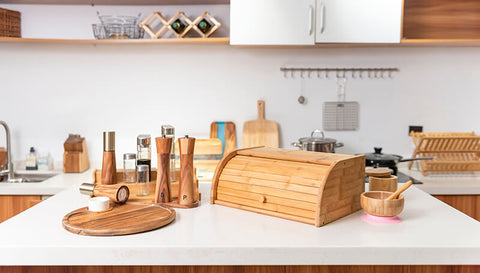How to Care for Your Wooden Utensils

You may have heard that wooden utensils can harbor bacteria and germs, but this shouldn’t be a reason to avoid them! Wooden utensils are a great sustainable kitchen switch, and they only require a bit of care to last for years.
Cleaning your wooden utensils doesn't have to be complicated. All it requires is some soap and water, a dishcloth and some elbow grease. Afterwards, simply let them dry and store them in a safe place. Routine oil treatments can also help to prevent splintering and will keep your utensils in their best shape for years to come.
Bacteria and germs are only an issue if wooden utensils are not properly and cared for properly. In this article, we’ll describe how to care for your wooden utensils to keep them nice, clean, and safe to use.
How to Care for Your Wooden Utensils
You can clean your wooden utensils with just a few products that you likely already have in your house. Wooden utensils should be cleaned after each use to prevent buildup and damage. While bamboo utensils don’t absorb water and are easier to care for, other types of wood can easily harbor bacteria.
To clean your wooden utensils, first rinse the wooden utensil under warm water to remove any food particles. Next, create a sudsy solution with dish soap and warm water. Use the dishcloth to scrub the suds into the wood using circular motions, and never put them in a dishwasher. Finally, rinse the soap off with clean water and dry the utensil with a clean towel or air dry.
You can keep your wooden utensils nice for longer by also routinely treating them with a natural mineral oil such as olive, coconut, or almond oil. Simply use a small amount of oil and evenly cover your utensils and other wooden kitchenware with it, then let it soak in overnight. You can also use a fine grain sandpaper to sand down any splinters or rough spots that may occur with use.
Why It's Important to Clean Your Wooden Utensils
It's important to clean your wooden utensils regularly because bacteria and germs can build up on them over time. If these bacteria are ingested, they can cause stomach upset or even food poisoning.
If you notice any damage to your wooden utensils that can’t easily be sanded away, throw them away and buy new ones. If you clean them regularly and keep them in a dry place, they can last for years. However, if they are not properly cared for, they may only last a few months.
Always be sure to check for damage before using wooden utensils and discard them if they are not in good condition. Remember that uncoated wooden utensils can be put into a compost bin to decompose naturally.
Conclusion
Wooden utensils are a sustainable choice of dishware. They are biodegradable and come from a renewable resource, plus wooden cutlery brings a natural charm to any kitchen. Bamboo utensils such as chopsticks and plates are particularly eco-friendly as bamboo is a fast-growing plant. It is durable enough to last for many years, and it doesn’t harbor bacteria like other types of wood can.
Keep reading:

